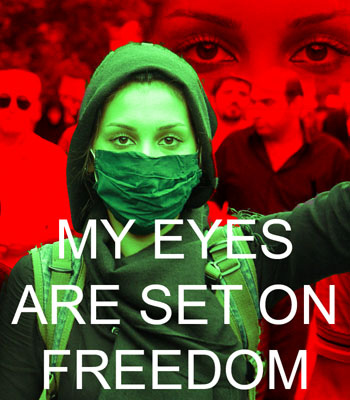NPT: Nuclear Weapons and Tension Areas
Rene Wadlow
As Winston Churchill once quipped “God so loved the world that he did not send a committee”. The Drafting Committee of the Review Conference on the Treaty on the Non-proliferation of Nuclear Weapons (NPT) was unable to draft an “outcome document” or as it is sometimes called “a final statement”. Even with the last-days efforts of the President, Ambassador Taous Feroukhi of Algeria and the UN Disarmament Secretariat to smooth over the rough edges of the document by weakening all the controversial wording, there was no possible meeting of minds.
In the end, the USA, UK, and Canada refused to accept the final document citing the paragraph proposing a nuclear-weapon free zone in the Middle East. Since there has been no visible progress on the reduction of nuclear weapons through negotiations among the nuclear-weapon States − the USA and the Russian Federation hold some 95% of them − efforts have been made to make legally-binding nuclear-weapon free zones. The first nuclear-weapon free zone to be negotiated was a direct aftermath of the Cuban missile crisis of October 1962.
A nuclear exchange between the USA and the USSR was close enough so that the Latin American leaders were moved to action. Mexico under the leadership of Ambassador Alfonso Garcia- Robbles at the UN began immediately to call for a de-nuclearization of Latin America. In February 1967 the Treaty for the Prohibition of Nuclear Weapons in Latin America was signed at Tlatelolco, Mexico. It established a permanent and effective system of control which contains a number of novel and pioneering elements as well as a body to supervise the Treaty. The Latin American Nuclear-weapon Free Zone was followed by four other geographic zones: South Pacific, Southeast Asia, Africa, and Central Asia − basically States which have neither the financial or technical capacity to develop nuclear Today, there are four tension areas that involve States which have nuclear weapons and where no negotiations to reduce tensions are going on: Korea, India- Pakistan, the wider Middle East, and USA-Russia.
Only Korea and the Middle East were mentioned by name in the draft “final statement”. However when the draft speaks of “nuclear-weapon States”, they have the US and Russia in mind. “The Conference notes with concern that, despite the achievements in bilateral and unilateral nuclear arms reductions, the total estimated number of nuclear weapons deployed and in stockpiles of nuclear-weapon States still amounts to several thousands and many remain on high alert. The Conference stresses in this regard that the reductions in deployment and in operational status are welcome but cannot substitute for the irreversible elimination of nuclear weapons as required under Article VI of the Treaty.
The Conference notes concerns expressed by non-nuclear weapon States regarding programmes for the development of advanced new types of nuclear weapons as well as the qualitative improvements of existing nuclear weapon systems.” There have been earlier calls for a Middle East Nuclear-weapon Free Zone. The NPT Review and Extension Conference in 1995 called for a conference to negotiate such a nuclear-weapon free zone. The desirability of establishing such a zone and eliminating nuclear-weapon delivery systems is widely recognized. Indeed, the United Nations General Assembly has resolutions calling for such a zone, first introduced by Egypt and Iran in 1974. Since 1980, such resolutions have attracted consensus support, including the qualified endorsement of Israel which has supported the concept but argued that it cannot proceed until peace settlements are achieved with its neighbors. The Israeli government continues to argue that negotiations on such a zone can only be considered following peace settlements with all of its Arab and Islamic neighbors.
There is also the possible linkage between nuclear and chemical weapons, involving the perception that the nuclear option may be needed as security against Mohamed ElBaradei, former Director of the UN's International Atomic Energy Agency (IAEA) has called for negotiations on such a zone. “ This is the last chance to build security in the Middle East based on trust and cooperation and not on the possession of nuclear weapons.” At the NPT Review, it was the delegation of Egypt led by Assistant Minister of Foreign Affairs Hashim Badr which was most active in pushing for the UN Secretary General to call for a conference in 2016 to discuss a Middle East Nuclear-weapon Free Zone, if Israel wants to attend the conference or not. He also called for the replacement of Ambassador Joakko Laajava of Finland for being ineffectual. Finland has been charged by the UN to organize such a conference. Finland has been willing to host it, but no visible progress has been made. However the problems of the Middle East are not conditioned by the quality of diplomats from Finland.
Finland, as a neutral between NATO and the Warsaw Pact States during the Cold War (1945-1990) developed a diplomatic service of greater skills and number than a State of that size would normally have. This is true for the same reasons of the Swiss diplomatic service, but Middle East tensions are such that neither Finland nor Switzerland have much influence. There were some, myself included, who felt that the recent nuclear agreement with Iran would create an atmosphere that would allow for progress. I had written in mid-April at the start of the month-long NPT Review “Today, all who are concerned with peace and cooperation in the wider Middle East region can take heart from the progress made in the accord on the Iranian nuclear program.
There are still elements which need to be finalized, but the current accord is a witness to the value of good-faith negotiations to find avenues of common interest. “This search for security based upon common endeavors must continue and gain in momentum. The present improvement in relations with Iran is the time and the opportunity to undertake the task of building common security in the Middle East. Acting together, States and peoples, both those of the Middle East and those outside, must help to define a dynamic vision and program for achieving security and peace, a program that is realistic, achievable and that stimulates the large cooperative response that is so urgently needed.” I underestimated the difficulties that would arise in the Review Conference over the Middle East.
Rather I had thought that US-Russian tensions over Ukraine and NATO reactions might prevent a consensus as the Soviet moves into Afghanistan in January 1980 had created such tensions that the 1980 NPT Review was unable to agree on a “final statement”. However, the Ukraine-related tensions did not come up publicly, and it was the Middle East Nuclear-weapon Free Zone that focused the disagreements. A major difficulty of moving to good-faith negotiations on a Middle East Nuclear- weapon Free Zone is the absence of a regional organization involving all States in the wider region. There needs to be leadership from within the Middle East for constructive, institution-building action. I believe that there is an urgent need to take steps toward creating a broad security and cooperation zone which has conflict resolution, arms control, human rights, and economic cooperation dimensions.
The prime example of such a multi-purpose regional security organization is what is today the Organization for Security and Cooperation in Europe (OSCE). The creation of such an organization arose from proposals and discussions in the late 1960s as an effort to find ways for structured discussions between NATO, Warsaw Pact and neutral countries of Europe. In the late 1960s and early 1970s, it was a small number of Non- governmental organizations (NGO) which were first calling for a pan-European Formal talks among government representatives started in Helsinki during the first half of 1973 and then were carried on from September 1973 to June 1975 in Geneva. However, prior to 1973 and during the Geneva stage of the negotiations there had been a good number of informal discussions including NGOs and academics. Likewise today, it may be that there is still such great suspicion of the motives of States in the Middle East that NGOs must again take the lead.
Helping to build an Organization for Security and Cooperation in the Middle East is a challenge to all of us of good will − a creative challenge which we must undertake together. Another major difficulty for the governments to reach a consensus at the NPT Review is that there is no real UN forum to discuss disarmament and arms control. In the early NPT Reviews, compromises were reached because the most active disarmament ambassadors, such as those of Mexico, Sweden and Yugoslavia were willing to accept weak “final statements” knowing that they could fight again another day in the Conference on Disarmament in Geneva.
Today, the Conference on Disarmament is so soundly asleep that what arms control discussions are carried out in the UN are done at the UN General Assembly. However, the General Assembly was not designed for continued and technical discussions on arms issues. The NPT draft statement was polite yet noted that “The Conference expresses its concern that since the 2010 Review Conference, the Conference on Disarmament has not commenced substantive work on any agenda item in the context of a comprehensive and balanced programme of work.”
I tend to be pessimistic concerning the will of governments to deal with disarmament and arms control issues. I see no national leaders, and when States regularly met at the UN or in treaty reviews such as the NPT Review, there is constant repetition but little forward motion. Unlike human rights and socio-economic development where NGOs can work at the local level while at the same time trying to influence national and world policy at the UN, military strategy, arms production, deployment of military forces − all are in the hands of national executives with some small influence from legislatures.
The area where NGOs might have an impact, as I mentioned, is to focus on the creation of an Organization for Security and Cooperation in the Middle East. Perhaps also efforts to reduce tensions concerning Ukraine and NATO reactions would be useful as the tensions have grown well beyond a reasonable evaluation of the situation.
Strong and diverse NGO leadership is needed − leadership whose voices can be heard above the beating drums and saber rattling.
Copyright http://www.mediaforfreedom.com


